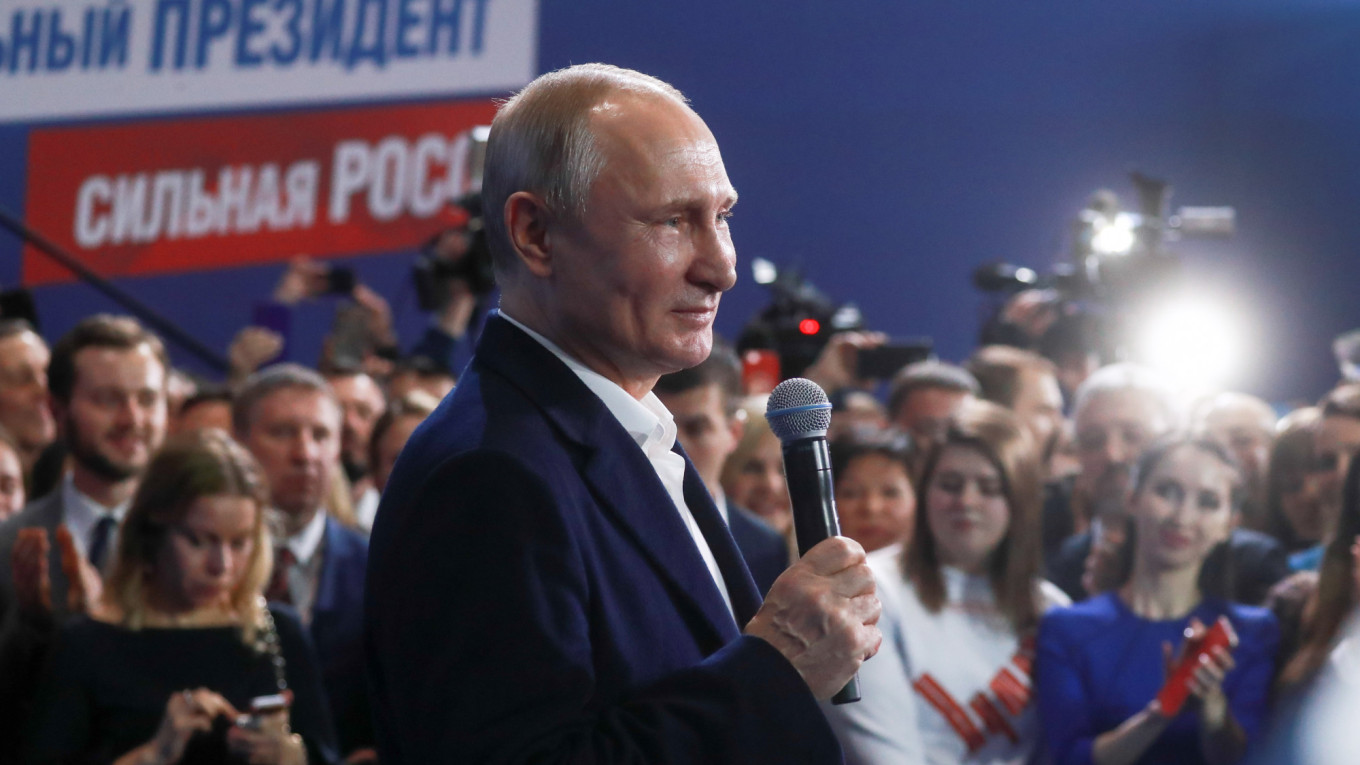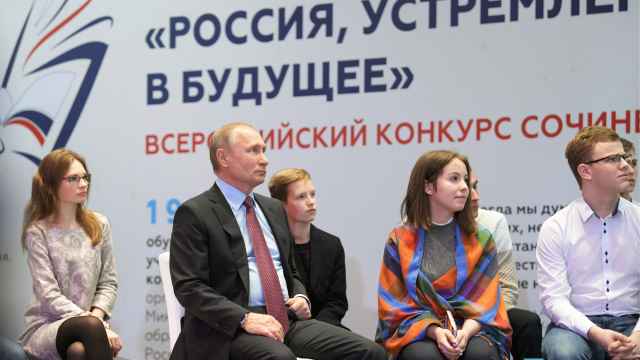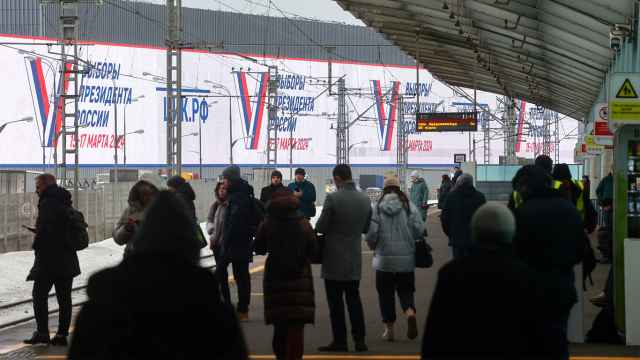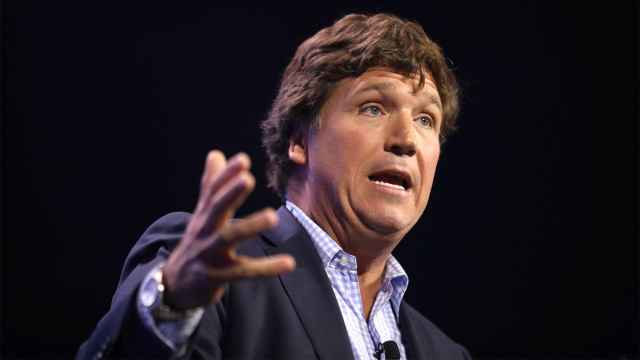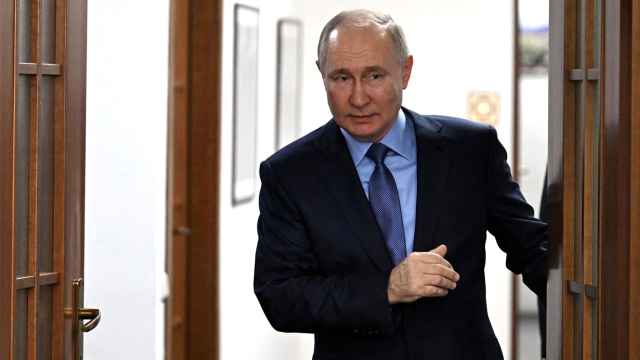In a choreographed and widely predicted move, President Vladimir Putin announced Friday that he will run for a fifth term in the 2024 presidential election next March.
The 71-year-old, who has been in power since 2000, is expected to run virtually unopposed apart from a few handpicked challengers following the adoption of wartime censorship and the crushing of the liberal opposition.
His next six years in office promise to keep Russia on its path of socially conservative policies and pivot away from the West, while his readiness to wage war on Ukraine for as long as it takes to win stands to put mounting strain on the unity of Kyiv’s allies, experts told The Moscow Times.
The Kremlin’s confidence is boosted by the economy’s better-than-expected growth under its second year of wartime sanctions, but experts warn that risks of economic overheating will persist.
In the Kremlin’s gilded tsarist interior, the plea to go to the polls — which is how Putin always reveals he will run for a new term — was made by Artyom Zhoga, a pro-Russian separatist from Ukraine’s Donetsk region who fought against Kyiv’s forces since 2014 and last year became the head of the region’s Russian-installed parliament.
“I won’t keep it secret, I’ve had different thoughts at different times. But now you are right, this is a time when you have to make a decision. I will run for president,” Putin replied, trying to appear surprised.
The Kremlin had in fact been preparing for Putin’s campaign all year, with Russian media regularly reporting on presidential administration meetings about election preparations.
This summer, Kremlin spokesman Dmitry Peskov said that Putin would easily win the 2024 election, although Putin himself claimed at the time that he had not yet decided if he would run. In August, a Kremlin source told the RBC and independent Meduza news websites that the goal is for Putin to win over 80% of the vote, surpassing his 2018 performance.
Kremlin officials, including domestic policy chief Sergei Kiriyenko, have been seen at events with the heads of regional election commissions where the presidential election was discussed.
The presidential campaign will be “almost a sprint,” resembling the Kremlin’s campaign in the 2018 election, Russian political analyst Ekaterina Kurbagaleeva told The Moscow Times.
The Kremlin may once again choose to collect signatures — at least 300,000 are needed to be nominated as a candidate — and cast this as a sign of Putin’s public support.
As in previous election cycles, Putin will likely publish lengthy thinkpieces and speak at large concert rallies featuring pro-war musicians and state employees in the stands. In addition, well-known Russians who will join his team of supporters will campaign for him, Kurbagaleeva said.
The Russia that Putin rules over today is drastically different from the country he led 10 years ago.
On the eve of the 2014 Sochi Winter Olympics, Putin assured Western journalists that Russia was pursuing a democratic path and a peaceful foreign policy.
He rejected the suggestion that he is a “Russian bear who wears a mask with a smile” — and responded positively when asked whether he could be described as “a kind, liberal president whom no one should fear.”
He claimed at the time that the law banning “gay propaganda” did not infringe upon the rights of LGBT people and said that he had friendly relations with the LGBT people among his staff, some of whom he said had received state honors.
Just a few months later, in March 2014, the Russian army annexed Crimea and launched a hybrid war in eastern Ukraine on Putin's orders.
In February 2022, Putin ordered the full-scale invasion of Ukraine, setting off a cascade of domestic political repressions and alienating Moscow from the West.
Nearly all of the country’s liberal opposition have fled the country or been sentenced to lengthy jail terms.
Russian authorities blacklisted the international LGBT movement as “extremist” in November and several regions have tightened restrictions on abortion this fall, moves seen by experts as early efforts to rally Putin’s conservative base ahead of the election.
Today, Putin’s thinking and policymaking are built on the confrontation between Russia and the West, Russian political analyst Konstantin Kalachev told The Moscow Times.
Defending against supposed Western influence and attempts to destroy the traditional family, faith and national pride will be a key component of Putin's campaign, Bloomberg reported.
“This is not the time for rational positioning based on elaborate plans and strategies,” Kalachev said.
This “conservative pivot” will be one of three pillars of Putin’s campaign, Oleg Ignatov, a senior analyst at the International Crisis Group, told The Moscow Times.
“Restricting abortion, fighting gay marriage, all of this has happened before,” Ignatov said. “But now the Kremlin has decided to step on the gas.”
The second is the war in Ukraine and the glorification of Russia’s “existential battle” with the West.
The third and most important pillar is the economy, which has weathered the international sanctions meant to punish the Kremlin for its invasion of Ukraine.
“Revenues are growing. The sanctions have not worked. This came as a surprise even to the Kremlin itself,” said Ignatov.
Huge sums of money have been invested into industry, factories are working around the clock, wages are rising, and expert forecasts say GDP growth by the end of 2023 will be more than 3.5%, higher than that of Western countries.
“Putin's electorate … bears the burden of the war the most, people from the regions are fighting and dying the most. But they get a big redistribution of income for it,” Ignatov said.
However, the successful transition to a war economy carries long-term risks for the Kremlin. The war has required increasing amounts of resources, and military spending has surpassed social spending.
When the war ends, military demand will plummet, it will take time to rebuild the economy, and sanctions will remain, coalescing in a structural shock, wrote Alexandra Prokopenko, a nonresident scholar at the Carnegie Russia Eurasia Center.
“Overheating of the economy today — and 3.5% growth with a doubling of wages and 80% capacity utilization is definitely overheating — is a deduction from the future. Because recessions after overheating are usually more painful, and so many bad decisions have already been made that there is almost no space for good ones,” Prokopenko wrote.
The Kremlin may be waiting to announce unpopular political decisions until after Putin’s re-election, when it can say that Russia is united behind him and endorses the war on Ukraine, said Ben Noble, an associate professor at University College London and associate fellow at Chatham House.
“Once this formal mandate is resecured, we may well see some uncomfortable decisions made by the political leadership in Russia, much as the deeply unpopular 2018 pension reform was pushed through after Putin’s last election,” Noble said.
In his foreign policy, Putin will also maintain continuity, with little likelihood of an attempt to reset relations with the West.
“An improvement in relations between Russia and the West does not look likely [in the short-term] — and the renewal of Putin’s formal presidential mandate in the March election will only reaffirm that impression,” Noble said.
And in Ukraine, the Kremlin will continue to attempt to break the deadlock on the frontlines, with the possibility of a major new escalation once the election is over, Ignatov said.
"Putin is waiting for the anti-Russian consensus to crack,” Ignatov said. “What he sees now in the U.S. and in Europe around Ukraine only convinces him that he is right. So his goal is to force the West to negotiate on Moscow's terms — not only on Ukraine, but on the entire post-Soviet space. He wants to divide the world into spheres of influence again.”
A Message from The Moscow Times:
Dear readers,
We are facing unprecedented challenges. Russia's Prosecutor General's Office has designated The Moscow Times as an "undesirable" organization, criminalizing our work and putting our staff at risk of prosecution. This follows our earlier unjust labeling as a "foreign agent."
These actions are direct attempts to silence independent journalism in Russia. The authorities claim our work "discredits the decisions of the Russian leadership." We see things differently: we strive to provide accurate, unbiased reporting on Russia.
We, the journalists of The Moscow Times, refuse to be silenced. But to continue our work, we need your help.
Your support, no matter how small, makes a world of difference. If you can, please support us monthly starting from just $2. It's quick to set up, and every contribution makes a significant impact.
By supporting The Moscow Times, you're defending open, independent journalism in the face of repression. Thank you for standing with us.
Remind me later.



